Accept all cookies Accept only essential cookies See our Cookie Notice

About ESA
The European Space Agency (ESA) is Europe’s gateway to space. Its mission is to shape the development of Europe’s space capability and ensure that investment in space continues to deliver benefits to the citizens of Europe and the world.
Highlights
ESA - United space in Europe
This is ESA ESA facts Member States & Cooperating States Funding Director General Top management For Member State Delegations European vision European Space Policy ESA & EU Space Councils Responsibility & Sustainability Annual Report Calendar of meetings Corporate newsEstablishments & sites
ESA Headquarters ESA ESTEC ESA ESOC ESA ESRIN ESA EAC ESA ESAC Europe's Spaceport ESA ESEC ESA ECSAT Brussels Office Washington OfficeWorking with ESA
Business with ESA ESA Commercialisation Gateway Law at ESA Careers Cyber resilience at ESA IT at ESA Newsroom Partnerships Merchandising Licence Education Open Space Innovation Platform Integrity and Reporting Administrative Tribunal Health and SafetyMore about ESA
History ESA Historical Archives Exhibitions Publications Art & Culture ESA Merchandise Kids Diversity ESA Brand Centre ESA ChampionsLatest
Space in Member States
Find out more about space activities in our 23 Member States, and understand how ESA works together with their national agencies, institutions and organisations.
Science & Exploration
Exploring our Solar System and unlocking the secrets of the Universe
Go to topicAstronauts
Missions
Juice Euclid Webb Solar Orbiter BepiColombo Gaia ExoMars Cheops Exoplanet missions More missionsActivities
International Space Station Orion service module Gateway Concordia Caves & Pangaea BenefitsLatest
Space Safety
Protecting life and infrastructure on Earth and in orbit
Go to topicAsteroids
Asteroids and Planetary Defence Asteroid danger explained Flyeye telescope: asteroid detection Hera mission: asteroid deflection Near-Earth Object Coordination CentreSpace junk
About space debris Space debris by the numbers Space Environment Report In space refuelling, refurbishing and removingSafety from space
Clean Space ecodesign Zero Debris Technologies Space for Earth Supporting Sustainable DevelopmentLatest
Applications
Using space to benefit citizens and meet future challenges on Earth
Go to topicObserving the Earth
Observing the Earth Future EO Copernicus Meteorology Space for our climate Satellite missionsCommercialisation
ESA Commercialisation Gateway Open Space Innovation Platform Business Incubation ESA Space SolutionsLatest
Enabling & Support
Making space accessible and developing the technologies for the future
Go to topicBuilding missions
Space Engineering and Technology Test centre Laboratories Concurrent Design Facility Preparing for the future Shaping the Future Discovery and Preparation Advanced Concepts TeamSpace transportation
Space Transportation Ariane Vega Space Rider Future space transportation Boost! Europe's Spaceport Launches from Europe's Spaceport from 2012Latest

Lost in time
Thank you for liking
You have already liked this page, you can only like it once!
This artist’s rendition of time in space captures the movement, drama, and complexity of this cosmic abstraction.
Time is infamously relative. Whether an activity takes seconds or hours depends on your point of view. For astronauts living off-planet and experiencing roughly 16 sunrises and sunsets a day, the concept of time is even more warped. If astronauts float through space, do they also cruise through an altered sense of time?
Since perceptions of time and space are believed to share the same neural processes, and research on depth perception in weightlessness has shown that astronauts often underestimate distance, scientists speculate that for astronauts time also flies in space.
The Time experiment on the International Space Station investigates the claim that time subjectively speeds up in microgravity. ESA astronaut Alexander Gerst performed the experiment for the first time last week and will do so again throughout his Horizons mission.
Astronauts gauge how long a visual target appears on a laptop screen and their reaction times to these prompts recorded to process speed and attention.
Scientists are not only collecting data on the neurological mechanisms at work here. The relativity of time, after all, implies that it is all in your head. As much as we can objectively measure and plot time, how individual humans perceive it is not just neurological but also psychological.
This is an important factor to life both on and off Earth.
Space is and always will be a harsh environment for humans. As homey as the Space Station tries to be, it is light years away from the known comforts of home on Earth. Naturally, this can affect mental health and in turn their cognitive abilities. Being alert and focused in space is crucial to safety. An astronaut misjudging time can delay reaction and risk the safety and success of crews and missions.
Understanding these neurological and psychological triggers that warp our sense of time means countermeasures can be developed to calibrate our mental clocks.
Bringing these countermeasures down to Earth could improve the lives of those who suffer from isolation or confinement, whether real or perceived: the elderly and bedridden, people working shifts or in isolation, mentally-ill patients, and the incarcerated.
Follow more great science being done during Alexander’s mission via the Horizons blog and on social media.
-
CREDIT
A. Suenson -
LICENCE
ESA Standard Licence
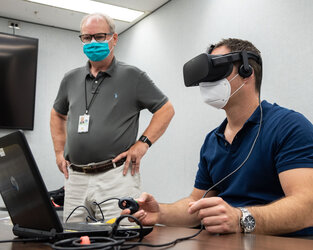
Thomas prepares for Time in space
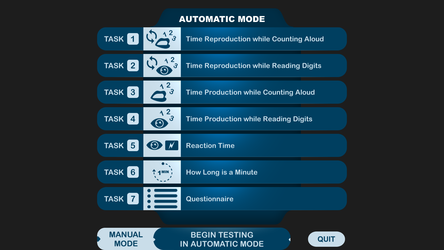
Time experiment screenshot
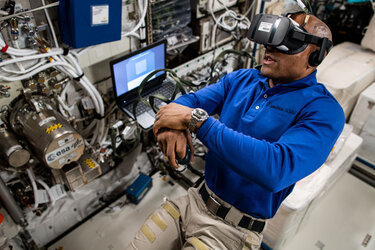
Time keeping
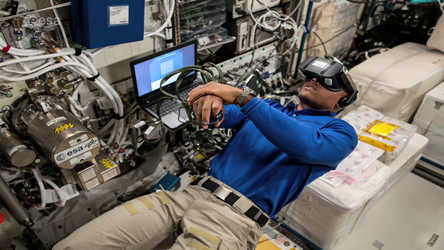
Time to timelapse
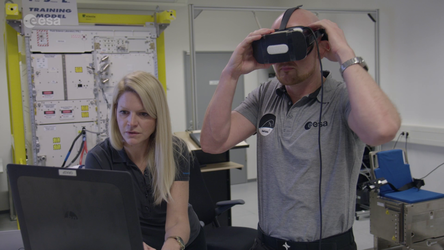














 Germany
Germany
 Austria
Austria
 Belgium
Belgium
 Denmark
Denmark
 Spain
Spain
 Estonia
Estonia
 Finland
Finland
 France
France
 Greece
Greece
 Hungary
Hungary
 Ireland
Ireland
 Italy
Italy
 Luxembourg
Luxembourg
 Norway
Norway
 The Netherlands
The Netherlands
 Poland
Poland
 Portugal
Portugal
 Czechia
Czechia
 Romania
Romania
 United Kingdom
United Kingdom
 Slovenia
Slovenia
 Sweden
Sweden
 Switzerland
Switzerland
























